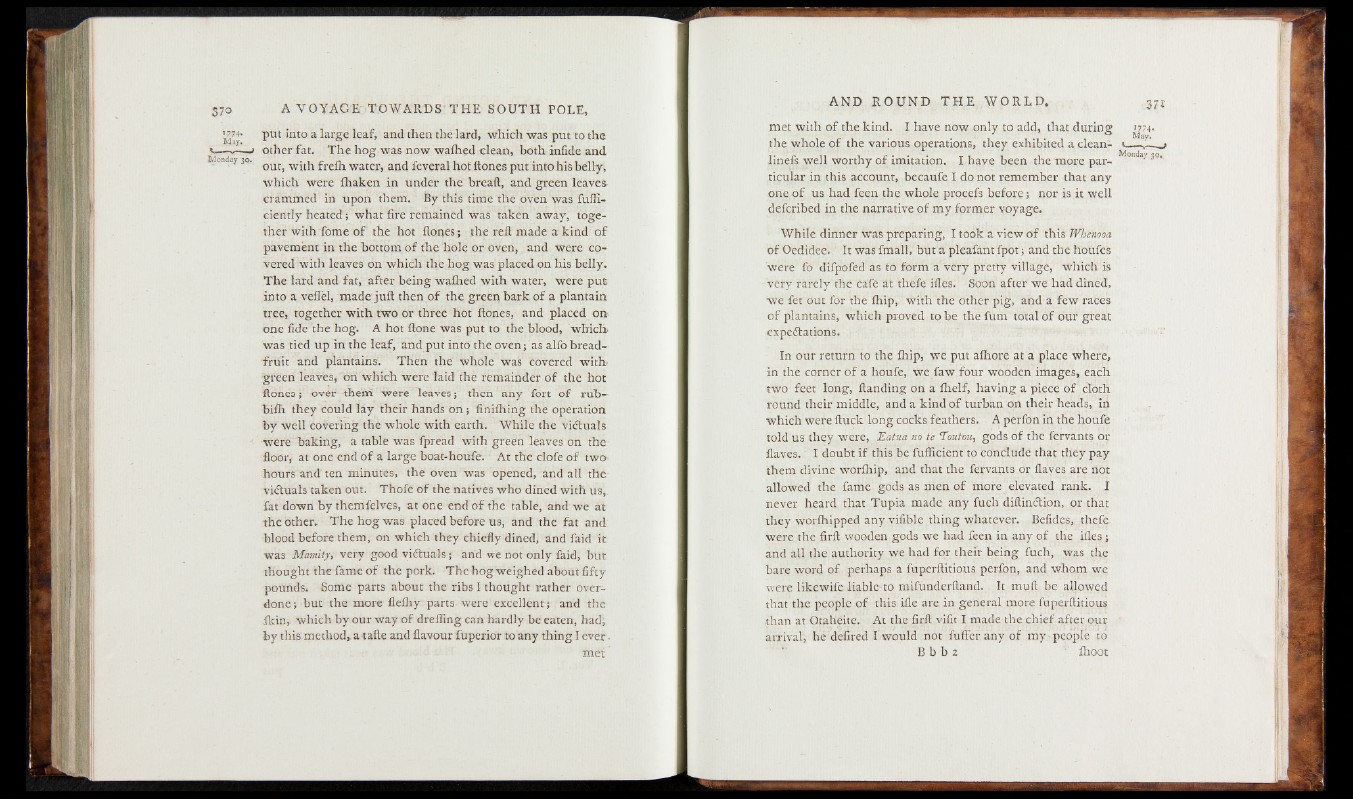
put into a large leaf, and then thé lard, which was put to the
other fat. The hog was now wafhed clean, both infide and
out, with frefh water, and feveral hot ftones put into his belly,
which were lhaken in under the breaft, and green leaves
crammed in upon them. By this time the Oven was fuffi-
ciently heated; what fire remained was taken away, together
with fome of the hot ftoties; the reft made a kind of
pavement in the bottom of the hole or oven, and were covered
with leaves on which the hog was placed on his belly.
The lard and fat, after being wafhed with water, were put
into a veflèl, made juft then of the green bark of a plantain,
tree, together with two or three hot ftones, and placed on
one fide the hog. A hot ftone was put to the blood, which,
was tied up in the leaf, and put into the oven; as alfo breadfruit
and plantains. Then the whole was covered with
green leaves, on which were laid the remainder of the hot
ftonés; over them were leaves; then any fort of rub-
bifli they could lay their hands on ; finifhing the operation
by well covering the whole with earth. While the victuals
were baking, a table was fpread with green leaves on the
floor, at one end of a large boat-houfe. At the clofe of two
hours and ten minutes, the oven was opened, and all the
victuals taken out. Thofe of the natives who dined with us,,
fat down by themfelves, at one end of the table, and we at
the other. The hog was placed before us, and the fat and
blood before them, on which they chiefly dined, and faid it
was Mamity, very good victuals; and we not only faid, but
thought the fame of the pork. The hog weighed about fifty
pounds. Some parts about the ribs I thought rather overdone
; but the more flelhy parts were excellent; and the
flrin, which by our way of drefling can hardly be eaten, had;
by this method,, a tafte and flavour fuperior to any thing I ever •
met
met with of the kind. I have now only to add, that during
the whole of the various operations, they exhibited a clean-
linefs well worthy of imitation. I have been the more particular
in this account, becaufe I do not remember that any
one of us had feen the whole procefs before; nor is it well
defcribed in the narrative of my former voyage.
While dinner was preparing, I took a view of this JVhenooa
of Oedidee. It was fmall, but a pleafant fpot; and the houfes
were fo difpofed as to form a very pretty village, which is
very rarely the cafe at thefe ifles. Soon after we had dined,
we fet out for the fhip, with the other pig, and a few races
of plantains, which proved to be the fum total of our great
expectations.
In our return to the fhip, we put afhore at a place where,
in the corner of a houfe, we faw four wooden images, each
two feet long, Handing on a fhelf, having a piece of cloth
round their middle, and a kind of turban on their heads, in
which were ftuck long cocks feathers. A perfon in the houfe
told us they were, Eatua no te Toutou, gods of the fervants or
Haves. I doubt if this be fufficient to conclude that they pay
them divine worlhip, and that the fervants or Hayes are not
allowed the fame gods as men of more elevated rank. I
never heard that Tupia made any fuch diftinClion, or that
they worfhipped any vifible thing whatever. Befides, thefe
were the firft wooden gods we had feen in any of the ifles j
and all the authority we had for their being fuch, was the
bare word of perhaps a fuperftitious perfon, and whom we
were likewife liable to mifunderftand. It muft be allowed
that the people of this ifle are in general more fuperftitious
than at Opaheite. At the firft vifit I made the chief after our
arrival, he defired I would not fuller any of my people to
B b b 2 Ihoot